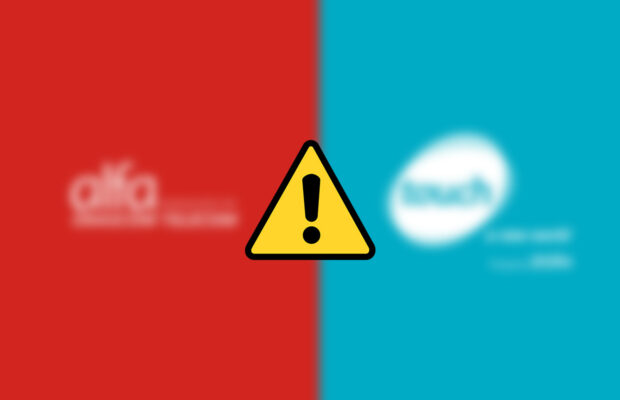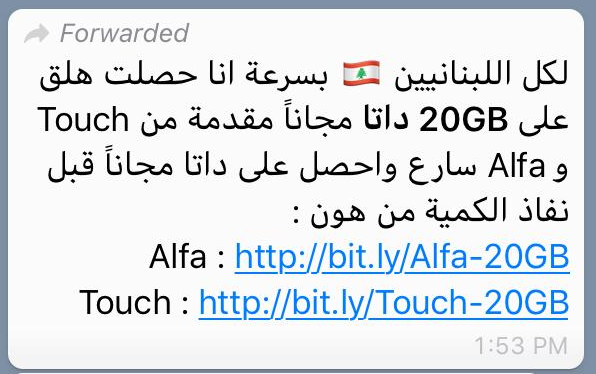Lebanon’s Touch & Alfa Are NOT Giving Away 20GB Free Data

We see these types of scams all the time, and this time, scammers are taking advantage of Lebanon’s current instability to trick users into sharing their personal information, potentially generating illegal revenue, and putting innocent people at risk of viruses and malware. Here’s what you need to know about this new scam taking over Lebanese social media.
On October 24, the scammers wrote and sent out this message on WhatsApp:

It roughly translates to “To all Lebanese, I just received 20GB of free data from Touch and Alfa. Hurry up and get your free data before it runs out.”
Obviously we’re all well aware by now that neither Touch nor Alfa are not going to give anyone free data.
So what happens if you’re gullible enough to click on one of those links? Well, let’s assume you’re an Alfa subscriber, and you click on the Alfa link. You first get redirected to a blogspot landing page that provides some brief information on what you’re about to receive, and prompts you for your mobile number at the bottom.

After entering your mobile number and clicking the red “send data” button, you pass through a “please wait” page and finally arrive here:

At this point, regardless of where you started off (via the Touch or Alfa link), you end up on this page.
The message on the page roughly translates to:
Dear customer, you have one more step to receive 20GB of data for free. Share the message to 10 people or groups on WhatsApp by clicking the “share” button below. Once you have finished, press the “confirm” button, you will receive 20GB of data immediately on your mobile number. Note: You will not get the data if you do not send the invitation.
You would then help the scammers spread this fake message by sending it to 10 people or groups on WhatsApp, in hopes of claiming your 20GB of free data. After clicking the red “confirm” button, you get redirected to some shady website that according to ESET Internet Security, contains dangerous content (viruses, malware, etc..).

You’d obviously realize at this point that you’ve been scammed. What you wouldn’t directly realize however (other than that you just put yourself at risk of viruses and malware), is that you just gave out your personal phone number to a complete stranger (which can be sold, or used to send you an unlimited amount of spam at a later stage).
This scam may seem pretty obvious for the tech-savvy individual, but sadly at the time of writing (and according to bit.ly’s link tracking tool), over 55,000 people have clicked on one of those links. Doing some basic math, you’ll realize that the scam message has been sent to potentially 550,000+ people on WhatsApp (and still growing).
- Check for yourself how many have visited the Touch link here: Tracking Link
- Check for yourself how many have visited the Alfa link here: Tracking Link
Now that we’ve addressed the scam, how can you protect yourself?
- ALWAYS fact check everything you receive on WhatsApp before blindly forwarding it to others.
- ALWAYS check your provider’s official website and/or social media accounts for news and updates.
- ALWAYS make sure you’re running some type of antivirus on your devices.
- NEVER give our personal information to anyone you don’t trust, or have doubts about.
- NEVER assume that anyone is going to give you something for free (pretty obvious).
SMEX, a Beirut based digital rights organization, recommends that you avoid clicking on and sharing these links because they may contain malware or collect data for unknown entities.
In Lebanon, links with fake offers from multiple companies, including telcos, are being shared frequently on social media and messaging apps. We recommend that you avoiding clicking on and sharing these links because they may contain malware or collect data for unknown entities. pic.twitter.com/xuzOgfPAJN
— SMEX (@SMEX) November 8, 2019
Did you receive this message on WhatsApp? Did you get tricked? Did you get any free data? Let us know in the comments below!













 © 2024
© 2024
0 comments